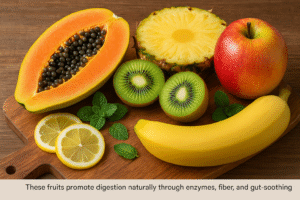
Digestive health is essential to how your entire body functions. A well-balanced gut supports your immune system, stabilizes energy, and improves how well your body absorbs nutrients. While supplements and powders flood the wellness space, fruits remain one of the most effective and natural ways to support digestion. In this expert-backed guide, you’ll discover the top 5 fruits with proven digestive benefits, how they work, and how to make them part of your daily routine.
1. Papaya
Papaya contains a natural enzyme called papain, which helps the body digest proteins more efficiently. This enzyme mimics the function of your stomach acids, supporting smoother breakdown and reducing bloating. Several clinical studies show that regular consumption of papaya leads to better stool frequency, softer texture, and fewer digestive complaints.
It also contains water and soluble fiber, both of which are crucial for maintaining gut motility. If you suffer from IBS, occasional constipation, or a sensitive stomach, papaya is among the easiest fruits to tolerate.
How to use it: Eat half a ripe papaya on an empty stomach in the morning, or blend it with ginger and lime juice for a light digestive smoothie.
2. Pineapple
Rich in the enzyme bromelain, pineapple helps digest protein-heavy meals and supports anti-inflammatory processes in the gut. Bromelain has been studied for its ability to reduce symptoms of bloating and slow digestion, particularly after meals high in meat or dairy. Unlike processed fruit, fresh pineapple retains this digestive enzyme, making it far more effective.
One cup of raw pineapple not only hydrates but actively supports gastric motility, helping food pass through your system more efficiently.
How to use it: Slice fresh pineapple and eat it alongside protein-rich meals to ease post-meal heaviness. Avoid canned varieties, as high heat destroys its enzyme content.
3. Kiwi
Kiwi offers a double punch: it’s high in fiber and packed with the enzyme actinidin, which improves the breakdown of dietary proteins. Clinical studies have shown that eating kiwi daily can improve gastric emptying and reduce feelings of bloating or indigestion.
Additionally, the combination of insoluble and soluble fiber supports gut flora, enhances stool consistency, and encourages more predictable bowel movements.
How to eat it: Enjoy two kiwis as a bedtime snack or mix into your breakfast bowl with oats or yogurt. The enzyme continues working even after digestion begins.
Source: Kiwi’s digestive effects — Healthline
4. Apple
The classic apple offers powerful gut support due to its high pectin content—a soluble fiber that feeds good bacteria in your digestive tract. This prebiotic action strengthens your microbiome, which is vital for digestion, immune regulation, and inflammation control.
Eating whole apples, especially with the skin on, provides the full range of fiber types. This improves stool formation and helps regulate both constipation and diarrhea symptoms.
How to use it: Wash and eat one raw apple mid-morning or slice it over a spinach and walnut salad. Skip apple juice—it lacks fiber and may spike blood sugar without gut benefits.
5. Banana
Bananas are gentle, nutrient-dense, and rich in resistant starch—especially when still slightly green. This type of starch feeds healthy gut bacteria and mimics the effect of soluble fiber, helping normalize digestion over time.
They also replenish electrolytes like potassium and magnesium, which are key when recovering from digestive issues like diarrhea or food sensitivity flare-ups.
A 2019 study involving IBS patients showed that eating one banana daily led to reduced bloating and more consistent stool patterns within three weeks.
How to use it: Add to smoothies with chia seeds and oats, or slice over peanut butter toast for a gut-friendly breakfast.
🍽️ How to Add These Fruits Into Your Day
Instead of relying on one “miracle” fruit, it’s best to rotate your choices and maintain consistency. Each fruit offers a unique profile—whether it’s enzyme-driven or fiber-rich—and together they help build stronger digestion over time.
Sample routine:
-
Morning: Half a papaya or slightly green banana
-
Midday: One apple with skin on, paired with a handful of almonds
-
Evening: Two kiwis after dinner
-
Post-meal: A few chunks of fresh pineapple for digestive support
Always drink water throughout the day to support fiber movement and keep your system hydrated.
❓FAQ
Q: What fruit is best for digestion?
A: Papaya, pineapple, and kiwi are standout choices due to their digestive enzymes. Apple and banana provide prebiotic fiber and help regulate bowel movements.
Q: Is it okay to eat fruit on an empty stomach?
A: Yes. Fruits like papaya, banana, and kiwi are especially beneficial when eaten first thing in the morning, as they’re easy on the stomach and start digestion naturally.
Q: Can certain fruits upset digestion?
A: Some citrus fruits, dried fruits, and grapes may cause bloating in sensitive individuals. Stick with low-acid, fiber-rich fruits like apple, kiwi, or banana if you have a sensitive gut.